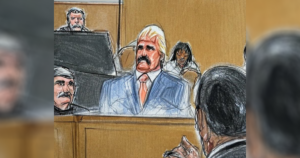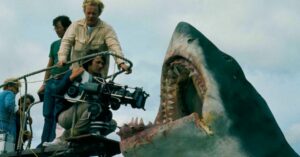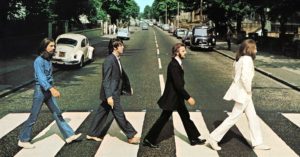In 1996, Weezer was at the peak of its white-hot fame. It was everybody’s favorite rock band, on the brink of releasing its long-awaited sophomore album. When the anticipation and hype reached a fever pitch, Pinkerton finally came out—and everybody hated it. Weezer had made a bold departure from the clean, power-pop sound of its first record, known as the Blue Album, to a much rawer, more emotional feel, and it hadn’t paid off. Pinkerton was a critical failure, a commercial flop, and an all-around embarrassment.
Until, somehow, it wasn’t. In one of the biggest turnarounds in rock history, Pinkerton went from a total disappointment to an album that critics and fans alike called one of the best of all time.
Twenty-one years after the now-revered album hit music stores to completely deaf ears, the band members involved look back on what led to their initially controversial, but ultimately beloved sophomore effort. This is the story of an album that frontman Rivers Cuomo hated so much he tried to disown it. This is the story of an album that nearly faded away completely before it ever became a hit. This is the oral history of Pinkerton.
Chapter 1: “It’s Been A While Man, Life’s So Rad”

In 1995, Weezer was on a national tour and had three smash hits on the radio. The band was a sensation, but frontman Rivers Cuomo wasn’t adjusting well to fame, and was already thinking about how to depart from the Blue Album’s sound in his next creative project.
Brian Bell (guitar, backing vocals): It was a crazy time for all of us. When the Blue Album became a huge hit, we became this group of dorky guys who were suddenly multiplatinum rockstars. When I used to go into a restaurant and ask for a soda, they would tell me, “No way, you freaky nerd!” But now they were saying, “Here’s your soda, you beautiful freak!” It was night and day. We were a huge deal.
Matt Sharp (bass, backing vocals): Just a few months before, I would walk into a library and the librarian would press the panic button because she would be afraid that I was about to try to read all her books. Once we got famous, I would walk into a library and the librarian would press the panic button because she would be afraid that I was about to put on a rock concert that would blow every other rock concert in history out of the water.
Brian Bell: It was definitely a whole new life.
Matt Sharp: We were living the dream: shows, girls, booze, shows, rock music, booze, girls, making out with girls, shows, having sex with girls after shows, drinking booze and listening to rock music, beautiful girls, beautiful booze, touching girls’ hair, getting drunk in the arms of girls, rocking out, rock shows, girls from the mountains, enormous cans of booze, singing out loud, crawling towards girls, and being the music men on stage.
Patrick Wilson (drums): When it comes to music I think drums are the tops—if drums are a crime then report me to the cops.
Rivers Cuomo (lead vocals, guitar): I was the only one who wasn’t taking well to the rockstar lifestyle. Yes, I was sleeping with a different girl every night, and it was unbelievably awesome, like, holy shit it was so cool, but it was also making me crazy.
Patrick Wilson: My drums are very loud and my sticks are very long. I use my drums and my sticks on every song.
Rivers Cuomo: Sex was my beautiful, horrible nightmare. I loved it so much that I hated it. Sex made me feel like I was in the most incredible pool in the world, but I was drowning. Michael Jordan was dragging me out of the water to give me CPR, but Sarah Michelle Gellar was slapping Michael Jordan in the face so he couldn’t save me. It was torture.
Matt Sharp: Rivers was tortured. He couldn’t enjoy all the cool stuff we got to do. We would go to a party and meet Will Smith, or we would get asked to babysit Jonathan Taylor Thomas or something awesome like that. But all Rivers would want to do was sit in the corner and have Lars von Trier watch him play solitaire.
Brian Bell: The shows were going great, though. The crowds were crazy for us. When we would start playing “Sweater’s Delight,” fans in the audience would look us straight in the eyes and slowly raise two thumbs up over the course of the entire song. When their thumbs were all the way up, that was how we knew the concert was over. Some of our concerts were only four minutes long.
Patrick Wilson: If you want a drum song, I can play you a few—making loud noises is what I love to do. It’s a rhythm and a beat that makes the people smile. Put my drum in a race, and it’ll win by a mile.
Matt Sharp: I think we all felt that “Sweater’s Delight” was a little gimmicky. It’s the oldest showbiz trick in the book: mention sweaters, and people go nuts.
Brian Bell: “Sweaters make the music as lovable as an angel’s mirthful smile” is a classic saying for a reason, and it was certainly true for us.
Rivers Cuomo: That gimmicky-ness bothered me. Everything was bothering me: the music, the shows, the girls—I was overwhelmed. My frustration got to a point where I would basically do a show, go back to our hotel, ask the concierge for a cup of tea, fall in love with that concierge, call in a second concierge to get ordained online and marry me to the first concierge, have a falling-out with the first concierge, and spend the rest of the night alone in the parking lot, screaming.
Matt Sharp: Rivers told us a thousand times that he was finished with sweaters and wanted to write about sex. He would get up in our faces and tell us, “Millions of people are having sex every single second, in this building alone. If we don’t sing about that, we’re not musicians—we’re just clowns with microphones and guitars in a band called Weezer.”
Brian Bell: He was obviously the songwriting expert, so we went with it.
Rivers Cuomo: My gorgeous and atrocious sexual desires had reached a boiling point. I thought that maybe if I expressed them, I would be able to resolve them, and maybe even meet the flawless, abominable woman of my dreams. But I didn’t think I could truly express myself until I had opened my mind to a world outside of rock shows and sex. Which was why I decided to go to college.
Chapter 2: “I’m Spread So Thin, I Don’t Know Who I Am”

Disillusioned with life as he knew it, Rivers Cuomo enrolled in Harvard University to continue his education. There, during a period of deep isolation and emotional turmoil, he started writing the songs that would become Pinkerton. Once he had finished, Weezer got into the recording studio to immortalize what Rivers had written.
Matt Sharp: We didn’t see Rivers for a few months, until we realized he was waiting in line to buy a ticket to Harvard.
Rivers Cuomo: When I went to get my Harvard ticket, there was a line around the corner and down the block. I got one of the last ones they had. So there I was, standing at one of the best educational institutions in the world, down $75 for the ticket, plus a $9.86 processing fee. I knew in that moment that no matter what music I ended up writing, I had to make the most of the educational experience. I had to get smart enough to defeat my sex demons.
Matt Sharp: While Rivers was in school, the rest of us were off working on our own projects. I got a job at a tattoo parlor giving tattoos that said “Surf’s up, suckers!” in cursive. It was a fun gig. A surprising number of people wanted that tattoo, and even if they didn’t walk in wanting it, it was a pretty easy sell.
Patrick Wilson: I was practicing my drums most every single day. I never asked for help and I never asked for pay.
Brian Bell: I spent a lot of time at home trying to remember which one is longer, a meter or a yard.
Rivers Cuomo: At Harvard, I kept myself completely isolated a lot of the time—noise-canceling headphones, blindfold, hazmat suit, everything. I would sit there all bundled up in my room, shred an entire Shakespeare play, eat it, throw it up, and then, as I was puking, I would be thinking, “What is love? What is sex? Why do they hate each other? Will they ever get married?” Eventually my roommate would come banging on my door telling me it was time for class, but I wouldn’t let him in.
Patrick Wilson: My instrument’s the kind where I get to sit down. “Drumming” is the verb and “drum” is the noun.
Rivers Cuomo: As isolated as I was, there was also a lot of drama in my personal life. I fell in love with a girl who turned out to be a reflection of a duck that I saw in a warped classroom window. I had really convinced myself that things were going to work out with her, so when they didn’t, it was crushing. The same thing happened with a girl who turned out to be a tall dining hall chair, a girl who turned out to be the floor of my room, and later on, a girl who turned out to be the concept of determinism, which I was learning about in my “intro to philosophy” class. Those failed relationships inspired a lot of Pinkerton. I was getting rejected thousands of times a day, and every time I did, I would write down all my feelings. I wrote until I had 700 songs, and then I pared those down to the 10 loudest ones.
Brian Bell: After a few months, Rivers emerged, pruned from lack of sun, and said, “I have the ideas. I have the songs. I cut my heart open and pulled them out—the riddle of sex is on the page, and all there’s left to do is sing it.” We started recording pretty much right after that.
Rivers Cuomo: I was excited that what I’d written was really brave and real and true to my own experiences. I had tried to draw on my personal life when I wrote the Blue Album, but all of that stuff got taken out in edits and never made it into the songs we ended up recording.
Matt Sharp: When Rivers first wrote it, “Sweater’s Delight” had a chorus that went “If you want to destroy my sweater / Just say ‘Rivers, please fulfill my wish.”
Brian Bell: Plus in “Crooner Extraordinaire,” the line was originally, “Ooh-wee-ooh, I look just like Rivers Cuomo / Oh-oh, and you’re Rivers Cuomo’s girlfriend.”
Matt Sharp: And in “Alone In My Car’s House” we had, “In the garage, I feel safe / No one cares that I wear glasses / In the garage where I belong / No one hears me practice Weezer.”
Rivers Cuomo: I had cut out all those lines because I thought they felt too raw, but on Pinkerton I was really letting loose. You can hear it from the first line on the album—“I’m tired / So tired / So tired of going to Harvard.”
Matt Sharp: Once we got in the studio it was back to the rock-and-roll lifestyle: playing music, writing music, music in rooms, music near walls, my bass, my hands, staying up late, waking up next to my bass, the morning, the evening, and being in the band. Rockin’ out, baby—24 and 7. Bass, guitar, drums, guitar, bass, drums, pamphlets about proper guitar care, singing till dawn, snacks, water, music, laying down tracks, and rockin’ out. It was that rock-and-rolling way to live—you know what I’m talking about. Music and music.
Brian Bell: We decided against using a producer for Pinkerton, which meant we didn’t have anyone to incentivize us to behave with a pizza party. When we recorded the Blue Album, our producer, Ric Ocasek, would tell us that if we were quiet and well-behaved and finished recording all our songs before 3:15, we would get a pizza party with soda and we’d get to watch Ghostbusters.
Matt Sharp: Not having that disciplinarian figure gave the songs a bit of a louder and rougher edge. There wasn’t anybody telling us to use our inside voices on Pinkerton. So we didn’t.
Patrick Wilson: I kept the beat and I kept it well. My drums were heaven and my sticks were hell.
Rivers Cuomo: In the studio, there was also the issue of the duck I’d fallen in love with, who had tracked me down and seemed to know I was singing about her. She clearly wasn’t happy about it, and she would gnaw at my ankles with her beak, which resulted in a lot of the pretty harsh-sounding vocalization I did on Pinkerton. When you hear me in the background yelling “I need some ibuprofen, the duck is at it again!” that’s where that came from.
Brian Bell: Aside from that duck, everything was feeling pretty good. We were ready to drop an album that we were all excited about.
Patrick Wilson: When I wake up in the morning, I give my drum a kiss, and when I hit it with my sticks, I never ever miss.
Chapter 3: “I Can’t Believe How Bad I Suck, It’s True”

Pinkerton hit stores on September 24, 1996 and immediately flopped. Sales were low, critical reception was poor, and Weezer fans who had loved the Blue Album were disappointed. Rivers Cuomo disavowed the album completely, going so far as to say that he was embarrassed he had ever written it.
Brian Bell: I’ll never forget the morning I picked up The New York Times at a newsstand, and there was the cover story, in huge type, above the fold: “We Here At The New York Times Think The New Weezer Album Sucks—It Just Plain Sucks, And If You Ask Us, That’s All There Is To Say About It.”
Matt Sharp: Underneath the headline they had a picture of the four of us drowning in a backyard pool. To this day I don’t know how they got that photo. It wasn’t Photoshopped. I don’t know how I know that, but it was definitely a real photograph.
Brian Bell: Immediately, we could tell that the album wasn’t selling. Stores would have piles and piles of our CDs outside on the sidewalk with the trash. Kids were climbing up the piles and getting hurt falling down. The surgeon general went on TV and interrupted the season premiere of The X Files to issue an official warning against kids climbing up piles of Pinkerton—that didn’t put us in a good light.
Rob O’Connor (critic, Rolling Stone): The bottom line was, Pinkerton didn’t follow through on the promise that the Blue Album had made. There were no sweaters—the world was waiting to hear about what happened to the sweater from “Sweater’s Delight,” and Pinkerton didn’t even come close to delivering. By the time I got to the fourth track, “Too Hot To Wear My Fall Clothes (Plus My Religion Says Tank Tops Only),” I knew the album wasn’t any good. Weezer needed to play the sweater game, but they wouldn’t do it, and for me, that was Pinkerton’s downfall.
Robert Christgau (critic, The Village Voice): When I first heard Pinkerton, I absolutely hated it. I didn’t want to listen to an entire album about Rivers Cuomo’s sex problems. If I had wanted to know about Rivers’ personal life, I could have just made a lunch date with his extremely nosy, extremely talkative eye doctor.
Rob O’Connor: Sometimes I worry we’ll never find out what happens to the sweater.
Rivers Cuomo: It was so embarrassing to have bared my entire soul and have the album be a failure. I couldn’t stand to have people know about it. I would walk onto the quad at Harvard yelling, “Please no one discuss or review my horrible failure, my bastard album, my Weezer disaster, my rancid Pinkerton.” I guess that was my social awkwardness coming out, because I didn’t realize that saying that would make everybody talk about it more.
Brian Bell: People kept inviting us these huge Hollywood parties that they said were in our honor. Then we would show up and they would say, “Surprise, this party isn’t for you—it’s for our friend Dustin, and it’s a party to celebrate how he has never failed at anything.” They would still let us stay and hang out, and we had some good times, but what they said stung. We felt like idiots.
Matt Sharp: My apartment was full of dozens of baskets of flowers I got in the mail from former fans with cards attached that said “These are for you to hate.”
Rob O’Connor: Pinkerton was too sharp of a left turn from the Blue Album, sound-wise, for people to latch onto. The Blue Album’s sound was cleaner and a bit softer, but also powerful, like a freshly laundered suit. Pinkerton was rougher and louder, like an eighth grade boy wearing basketball shorts who walks down the hallway shoving everybody for no reason. Everyone likes a freshly laundered suit, and nobody likes an eighth grade boy who shoves people in the hallway, so it was pretty obvious why Pinkerton didn’t go over the same way the Blue Album did.
Patrick Wilson: My band was sad about the bad reviews, but I cared about my drums and not about the news.
Todd Sullivan (Geffen Records A&R rep): I tried to put Weezer in the public’s good graces by setting them up to do a couple fun publicity stunts, but everything I tried ended up backfiring.
Rivers Cuomo: Todd got us invited to be in a dunk tank at an elementary school fair, which we thought might help our image, but it wasn’t one of those dunk tanks where the whole thing was all in good fun. The teachers lined up one by one and just whipped ball after ball at the target with laser accuracy—like they’d been practicing. They didn’t even give any of the kids at the fair a turn because they said they thought a child couldn’t “manage the job.” We tried to leave, but they had locked the gate around the blacktop.
Patrick Wilson: Things weren’t going well, but I didn’t really care—I was bangin’ on my cymbals and bangin’ on my snare.
Rivers Cuomo: The failure was especially painful because there were a lot of things that, in retrospect, I was ashamed about in the album. A lot of women had issues with some lyrics that they saw as misogynistic, which I felt badly about. People really didn’t like the line “If I’m a dog then you’re a bitch.” Looking back on that, I wish I’d said something more like “If I’m a dog then you’re a female dog,” or “If I’m a buck then you’re a doe.” Or even “If I’m a man then you’re a woman.” The point I was trying to get across in that line was that myself and the other person were of two opposite sexes, but I recognize that I could have been clearer.
Matt Sharp: Morale couldn’t have been lower. We would try to work on songs together, but that old Weezer magic wasn’t there anymore. We would open our mouths to sing, but all that would come out would be a long, low foghorn sound. Our instruments were all damp all the time, no matter what. Brian was covered in barnacles. We were beginning to lose hope.
Patrick Wilson: I love drums ’cause I’m a drummin’ lad. The guitar is my mom and the bass is my dad.
Brian Bell: Things fell apart pretty fast. Matt left the band officially. After that, Patrick, Rivers, and I were at a loss. We just stood in an empty room facing three opposite corners, shelling pistachios to entertain ourselves, eating the pistachios for sustenance, and charging people to watch us vomit up pistachios so we could buy more pistachios. Something had to change.
Chapter 4: “Fall In Love All Over Again”

The late ’90s were a difficult time for Weezer. After the embarrassment of Pinkerton, the band was in shambles. But in the ensuing years, new music distribution trends brought Pinkerton to more listeners, and little by little, the album became a cult hit. Years later, critics, fans, and even the band members themselves reversed their opinion on the album, ultimately making it one of the most beloved rock records of all time.
Rivers Cuomo: After I had spent years haunted by Pinkerton’s loud and evil ghost, things started to turn around when QVC started selling Pinkerton CDs by telling people they could use them to prop up wobbly chairs.
Brian Bell: A lot of stay-at-home moms saw the QVC spot and bought Pinkerton thinking it would be a useful household product. That got the ball rolling.
Justin Pierre (guitar and vocals, Motion City Soundtrack): I noticed Pinkerton wedged under a leg of my parents’ piano bench in the winter of 1999 and decided to give it a listen. It immediately became a huge influence on my music, and I think a lot of artists from my generation can say the same thing. Pinkerton is way more than something to shove up under a chair leg. It’s a record that showed a lot of musicians that it’s okay to bare your soul in your art, and also that sometimes a chair can look like a girl if it’s tall enough.
Matt Sharp: People were finally starting to understand our whole deal: being real, being raw, rocking hard, being loud, being mean, shredding, shredders, amplifiers, punching people in the face with our music, Weezer, our band, shredding, rock and roll, shaking hands with chicks, waving to our fans, late nights, girls in cars, girls on charter buses, girls without faces, and turning up the volume on how loud we were.
Gavin Edwards (critic, Rolling Stone): I was asked to re-review Pinkerton for Rolling Stone in 2004, and after I listened to it with fresh ears, the first thing I did was take down the banner at the top of Rolling Stone’s website that encouraged people to hunt down the members of Weezer and kill them by any means necessary. It just didn’t seem appropriate anymore. I was starting to appreciate that Pinkerton had a lot to offer, musically.
Brian Bell: That was a huge step in the right direction for the band. We were able to leave our apartments without worrying about people with bows and arrows or tranquilizer guns lurking around every corner, waiting to take us down.
Patrick Wilson: I was glad that people could enjoy my percussion. Drums sound good and it isn’t a discussion.
Matt Sharp: It was crazy the way public opinion was changing. I felt a little dumb for leaving the band, but I was back at the tattoo parlor, and this time they were letting me give tattoos that said “I’m your old man!” on top of a city-skyline background. It was another hugely popular tattoo, so I had my plate pretty full, creatively speaking.
Brian Bell: It started to feel less like we’d failed and more like we had a huge group of underground fans who bought our album to fix a problem in their house.
Rivers Cuomo: It took until recently, but watching all our fans reconsider Pinkerton helped me reconsider it, too. I used to wish I hadn’t released my private sexual torments into the world. But now I go to bed happy every night, knowing that somewhere out there, someone is listening to my music and enduring a depraved romantic nightmare of their own.
Brian Bell: Pinkerton went platinum in September of 2016, which was a wild experience. It was like turning in an English paper and getting an “F” on it, only to get a call 20 years later from your high school English teacher, who at this point has been dead for eight years, where he tells you that the paper just earned an “A.” In that situation, the English paper represents Pinkerton, and the English teacher represents the dead man who called me to tell me that Pinkerton had just gone platinum.
Rivers Cuomo: I got the same phone call from a man who said, “First of all, I’m dead,” as soon as I picked up the receiver, and then told me that Pinkerton had sold a million copies. And it closed the chapter on the album for me, to an extent. It felt pretty amazing.
Brian Bell: All we ever wanted was to reach people with Pinkerton, and after all this time, I do feel that we did that.
Matt Sharp: I’m proud of the album, I’m happy people enjoyed it, and I’m giving tattoos 9 to 5 at Rick’s Tat Shack in L.A. these days if anybody wants to come by and get one.
Patrick Wilson: That’s all there is to my Pinkerton story, so I hope you’ll put it in the “nice” category. If you need me again I’ll be playing my drums, with drums and my drums and my drum’s drum’s drums.
Rivers Cuomo: In the end, Pinkerton sucked and also ruled. Did it help me defeat the sexual poltergeists that inhabit my soul? Not exactly. Did I find out love’s address and smash its sunroom window so that I could rob its house? I didn’t. Was Pinkerton a good album or a bad album? Only God knows the answer to that question. All I can really say for sure is that Pinkerton was abhorrently terrible, but hey—it also rocked pretty hard.





